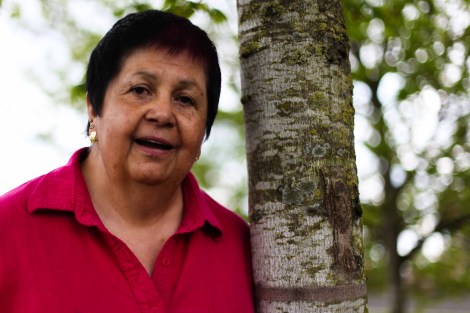Published in Indian Country Today Media Network | May 11, 2012 | Circulation: 300,000 monthly readers

Sharon McIvor, member of the Canadian Feminist Alliance for International Action (FAFIA), addressed the Inter-American Human Rights Commission on March 28. Photo by David P. Ball
The Inter-American Commission on Human Rights (IACHR) is scrutinizing the disappearance of more than 600 aboriginal women in Canada, only months after the United Nations announced its own investigation.
The commission—part of the Organization of American States—heard briefings from Canadian organizations and government representatives on March 28.
“For years, we’ve been bringing to the attention of the federal government, and the Canadian public, the high number of missing and murdered aboriginal women in Canada,” said Jeannette Corbiere Lavell, President of the Native Women’s Association of Canada (NWAC). “Canada was just not paying attention.
“Obviously, this is discrimination, on the basis of race, against aboriginal women. We want something specific to stop the violence and to get the police agencies more involved in this and make them aware. This is the tragedy we see. It has to come to an end.”
Lavell, who addressed the commission, said that Canada’s inaction represents a “form of genocide” and that a national public inquiry is needed.
The briefing adds to growing international scrutiny of a country that often boasts of its human rights record. In December the U.N. Committee on the Elimination of Discrimination against Women (CEDAW) announced it would open an investigation into the missing women if it found “reliable information indicating grave or systematic (rights) violations.” Canada has not yet responded.
“The numbers involved are alarming and should suggest urgent actions in response,” Dinah Shelton, an IACHR Commissioner, told Indian Country Today Media Network. However, Shelton added that the commission’s report will only be “thematic” in nature, reporting generally on indigenous women’s situation.
The briefing is a significant step, said the complainants, because previous investigations had censured OAS member states for rights abuses. In 2003, the commission published a scathing report criticizing Mexico over the disappearances and murders of 518 women in Ciudad Juarez.
“The situation in Ciudad Juarez came to the Commission as a complaint against Mexico and ended up before the court, where a judgment was taken against the government,” Shelton confirmed. “We do not have a similar petition concerning Canada, and I cannot comment in case a petition should arrive.”
The briefing heard presentations by NWAC and the Canadian Feminist Alliance for International Action (FAFIA), followed by a response from Justice Canada on behalf of the State.
“The Government of Canada continues to take steps to improve the response of the law enforcement and justice systems so they can better meet the needs of Aboriginal women and their families,” Justice Canada spokesperson Carole Saindon told ICTMN. “The government is also working with stakeholders to develop collaborative responses, such as improving support for police investigations.”
NWAC documented more than 600 missing or murdered aboriginal women using police and media reports. When asked about that figure’s accuracy, Saindon replied that the government has “confidence in [NWAC’s] work on this issue.”
For NWAC and FAFIA, petitioning for a formal investigation is a likely next step.
“We’re thinking about it,” said FAFIA Human Rights Committee member Sharon McIvor. “We have to exhaust domestic remedies before you can give a petition.
“We took Canada by surprise,” she continued. “They knew about CEDAW, but we wanted to go to multiple forums instead of just one. Our human rights are there, and they’re solid.”
